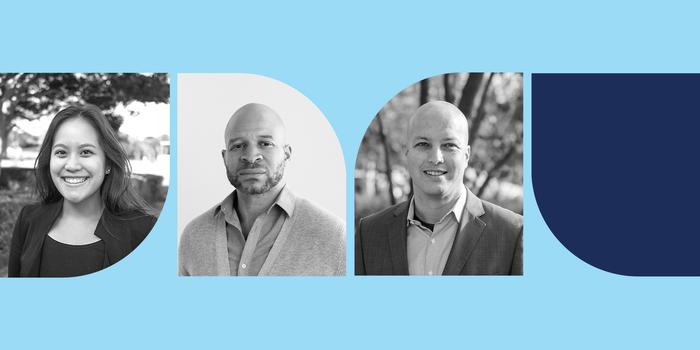
Throughout her career, Anna Tran has always looked for ways to build meaningful relationships with colleagues. She especially enjoys meeting people from departments she may not normally interact with. “It’s so important to have a sense of connection around you,” she says.
Tran, a portfolio development manager based in San Francisco, has been able to cultivate these close relationships with her coworkers at Cisco Meraki. Many of her deepest connections are the result of her leadership and involvement in the Connected Asian Affinity Network (CAAN), one of the company’s many Employee Resource Organizations (EROs).
“EROs bring groups of employees with shared values together and create an environment that fosters connections, so everyone can participate,” says Tran. “They create a rich diversity and members bring a lot of conversations to the table, providing opportunities for everyone to learn and grow together.”
Building a sense of community has been especially crucial in recent years, as the pandemic has upended employees’ lives, causing some to feel disconnected from their colleagues. Through it all, Meraki’s EROs have continued to achieve their intended goals: enabling employees to be themselves, feel supported, have tough conversations, raise awareness about their unique experiences, grow their skill sets, and bond over shared interests.
Here, three Meraki employees share how their involvement with EROs have impacted them both personally and professionally.
Building connections through shared experiences
“EROs offer a place for employees to be themselves while surrounded by people who share cultures and experiences,” says Obi Ugokwe, a business transformation manager at Meraki and leader of the Connected Black Professionals ERO. “They also serve as advocacy groups that represent members’ identities,” he says. “These organizations provide a support system employees can lean on if they need help navigating difficult situations in the workplace.”
That’s exactly how Daniel McMorrow, a virtual product sales specialist based in San Francisco, wants fellow veterans to feel about the Meraki Veterans ERO. As the group’s leader, he is aiming to foster the Meraki reputation as a place where veterans are supported when they face the often challenging transition from the military to a civilian role.
“The Meraki Veterans ERO gives us the opportunity to develop empathy for and be more connected with this community,” McMorrow says. “If a veteran comes to Meraki, they know there are other people they can turn to for support.”
McMorrow plans to create a version of a challenge coin—which military members receive as a reward for hard work or excellence—for Meraki Veterans ERO members. “It’s a way of saying, ‘Thanks for what you’re doing. I recognize and appreciate you,’” he says. He’s also creating an internal website for the ERO where veterans can discuss issues that are important to them.
Offering emotional support during troubling times
The extra stress brought on by the pandemic, combined with the divisive political and social climate, have taken an emotional toll on workers, and many continue to deal with the effects. Through it all, the supportive networks created by EROs have helped employees face these difficult times together.
In the aftermath of George Floyd’s murder, for example, Ugokwe says the Connected Black Professionals ERO gave Black employees a place to initiate and participate in conversations they may not have felt comfortable having with coworkers. “It’s important that we provide a space for employees to engage in these important conversations; an open dialogue can be a good way to foster a sense of community and support for those in need,” he says.
EROs also help raise awareness across the broader Meraki community about cultural and social justice issues that affect certain employees. For example, CAAN has hosted talks about the recent increase in hate crimes against Asians. “I really appreciated that, and it helped me feel supported,” Tran says. “I felt like I wasn’t alone.”
McMorrow acknowledges that he’s benefited from learning about the experiences of colleagues in other EROs. “I've gotten the most out of EROs where I'm not necessarily part of the community just by listening,” he says. “Being in the same room and hearing how people are feeling is powerful.”
Creating opportunities for professional development
Getting involved with an ERO can also have career benefits by providing employees with opportunities to expand their skill sets or create greater visibility for themselves at Meraki.
Being a mentor through CAAN has helped Tran develop and practice her coaching skills. She’s also gained experience organizing large-scale events, including a speaker session with an Olympic athlete who discussed Asian-American representation. The event attracted 200 attendees, and Tran moderated a question-and-answer session.
Ugokwe has also gained valuable management experience through his participation with the Connected Black Professionals ERO. “It has helped me develop into a better people leader,” Ugokwe says. “I’ve learned how to provide guidance, get folks working together, and keep people enthusiastic.”
The Connected Black Professionals ERO signed up for McKinsey’s Black Leadership Academy, which gives Black employees opportunities for professional and executive development. (According to Ugokwe, Meraki was one of the first companies to participate.) But, the career opportunities don’t end with current employees: the Connected Black Professionals ERO has also hosted workshops for students at historically Black colleges and universities (HBCUs) to teach students about tech careers and roles at Meraki.
This example of external outreach underscores the value Meraki places on cultivating a diverse and inclusive environment at the company—and that’s made possible through its EROs.
“I feel really grateful to work for an organization that sees the importance of these groups and encourages us to be a part of them,” Tran says. “Our EROs have access to resources to put on events that help promote employee engagement, connection, learning, and growth. I know this type of commitment doesn't exist everywhere; the support offered at Meraki isn’t something to take for granted.”